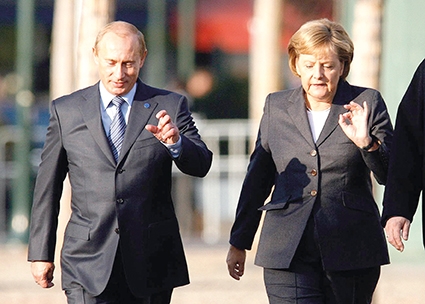Russia Will Try to Widen EU - US Differences
German Chancellor Angela Merkel visited the Russian President Vladimir Putin in the Black Sea resort of Sochi on May 18. The meeting came after a series of political rifts appeared between the Europeans and the United States over the Iran deal and the Russia-EU gas project dubbed North Stream 2. For Russia, it is an opportunity to widen the differences among the Western allies over crucial issues concerning the Russian state, such as Ukraine. Nevertheless, despite a difficult period in US-Europe relations, the transatlantic partnership will remain fundamental in wider geopolitical imperatives such as supporting Ukraine and a wider EU push across the former Soviet space.
The US opposes the North Stream 2 project for several reasons. The pipeline will further solidify the Russian energy presence in Europe which, geopolitically, is tantamount to Russian influence in the EU. Moreover, the project which will run through the Baltic Sea will bypass Ukraine, which is likely to lose a significant amount of transit income. Previously, following the fall-out between Russia and Ukraine over the Crimea issue, Kiev was creating difficulties for Moscow in allowing the transit of Russian gas to Europe. North Stream 2 will remove this obstacle for Moscow.
These reasons aside, the US is also interested in diminishing the Russian energy presence in Europe due to its own plans to increase exports of LNG to Europe. Washington even threatened to impose sanctions to stall the progress on North Stream 2, angering Berlin, and there are signs that Europe and the US could further clash over other trade issues.
European attitudes towards Washington are also strained after the recent US withdrawal from the 2015 Iran nuclear deal. France and Germany were joined by Russia in urging the need to preserve the deal.
For Putin, these developments between Europe’s leading states and the US present a certain possibility of rapprochement with Germany. The relations between the two states have been strained since the Ukraine crisis in 2014, and Russia has been attempting over time to challenge the united western front.
From the Russian perspective, the most important issue is Ukraine, and the German stance is crucial in that sense. Merkel and Putin might indeed find common ground for deeper cooperation, but how far reaching it could be is uncertain.
The same Ukraine issue serves as a fundamental problem and any wavering in stance from the German side will likely meet opposition from other European states as well as its US partners. Moreover, Berlin has always been quite clear about the Russian role in the Ukraine conflict and that anti-Russian sanctions are unlikely to be lifted unless Moscow’s position changes.
In the long run, Russia-EU relations are likely to remain deeply troubled as Moscow continues to see the EU’s steady expansion into Eastern Europe as undermining it own geopolitical interests.
The US, Germany and the rest of the EU might clash on economic aspects of their partnership, but they nevertheless share similar geopolitical imperatives of countering Russian influence in eastern Europe and the South Caucasus.
In this light, the Merkel-Putin summit should rather be seen as a step towards meeting the immediate goals set by both governments – to get the North Stream 2 going – rather than a definite sign of a serious rapprochement between the two states on larger geopolitical issues.
Thus, although the Russians could potentially hope for widening the existing differences between Europe and the US, Russian leaders see that Europe’s relations with Washington would not be fundamentally damaged. In fact, Merkel herself, following the meeting with Putin, said: “We have a strong transatlantic friendship, which during its history has had to withstand many questions of different opinions, and I think that might be the case now as well."
By Emil Avdaliani











